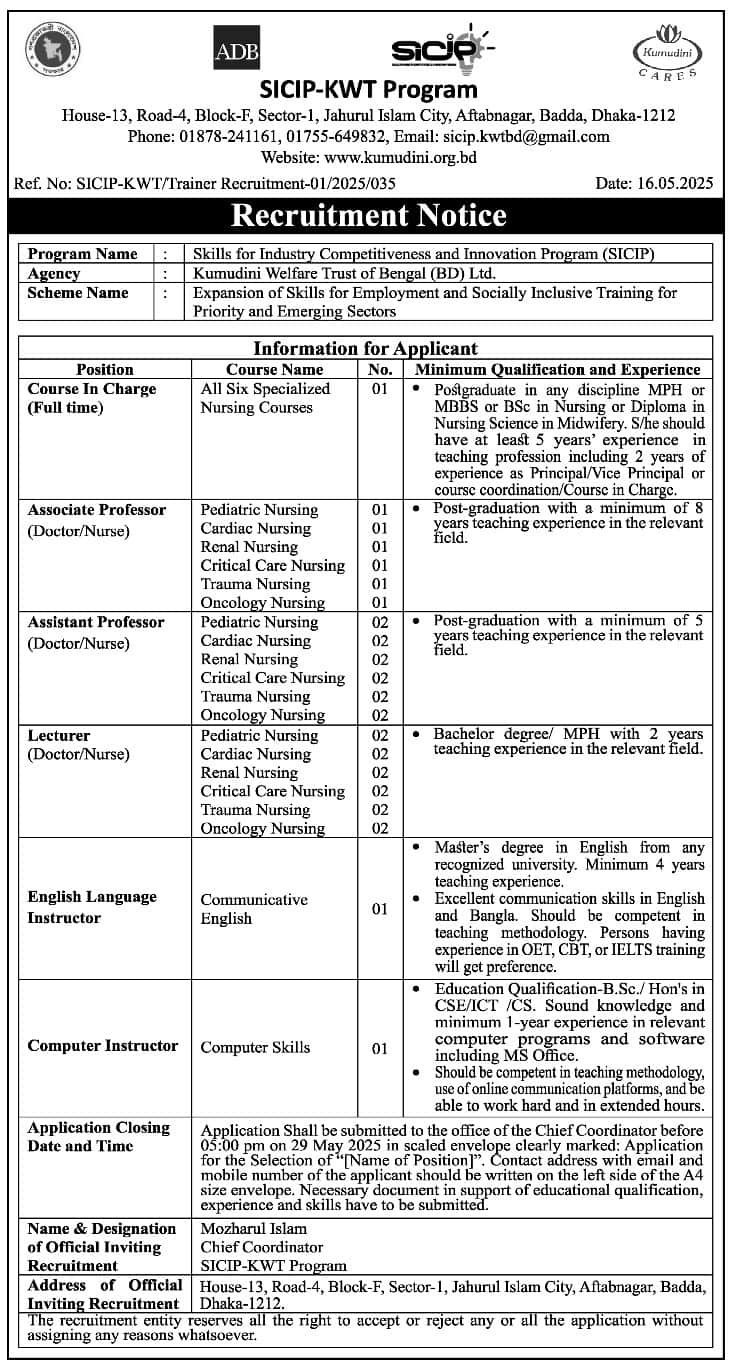Skills for Industry Competitiveness and Innovation Program Job Circular
SICIP Job Circular, SICIP Job Circular 2025
চাকরির বর্ণনাঃ
স্কিলস ফর ইন্ডাস্ট্রি কম্পিটিটিভনেস অ্যান্ড ইনোভেশন প্রোগ্রাম এ বিভিন্ন পদে নিয়োগের জন্য যোগ্য প্রার্থীদের কাছ থেকে দরখাস্ত আহবান করা হয়েছে।
পদ সমুহঃ
নিচের বিজ্ঞাপনটি দেখুন
আবেদন করার প্রক্রিয়াঃ
আবেদনের শেষ তারিখ: ২৯/০৫/২০২৫ ইং
বিস্তারিত এই বিজ্ঞপ্তি তে দেখুন, (বিজ্ঞপ্তিটি ডাউনলোড করতে নিচের ছবিতে ক্লিক করুন)
The Skills for Industry Competitiveness and Innovation Program (SICIP) is a government initiative in Bangladesh aimed at enhancing the skill capacity of the labor force through technical and ICT-based training. The program focuses on market-responsive, inclusive skills training in priority sectors to create more employment opportunities and elevate existing remittance levels.
SICIP is managed by the Finance Division of the Ministry of Finance, with Dr. Md. Khairuzzaman Mozumder serving as the National Program Director.
The program offers various training courses and resources, including competency standards and learning materials. Admission circulars for different courses are regularly updated on the official SICIP website.
The webpage you provided is about a job circular for the “SICIP.” It invites eligible candidates to apply for various positions. If you need more details or want to download the full circular, you can click on the link to see the complete information.
The SICIP typically refers to initiatives or policies that aim to align workforce skills with the needs of evolving industries, especially those focusing on innovation, technology, and global competitiveness. These programs are usually implemented by governments, educational institutions, or industry bodies.
Here’s a breakdown of what such a program might involve:
Core Objectives
-
Enhance Workforce Skills
-
Upskilling and reskilling workers to match industry demands.
-
Focus on both technical (e.g., AI, advanced manufacturing) and soft skills (e.g., critical thinking, communication).
-
-
Promote Industry Innovation
-
Support innovation through workforce development.
-
Foster a talent pool capable of driving R&D and tech adoption.
-
-
Bridge Academia-Industry Gap
-
Align education and training programs with real-world industry requirements.
-
Encourage collaboration between universities, vocational institutions, and companies.
-
-
Boost National/Regional Competitiveness
-
Strengthen key sectors to compete in global markets.
-
Foster entrepreneurship and innovation ecosystems
-
Key Components
-
Sector-Specific Training Programs
Targeted at industries like manufacturing, ICT, biotech, or green energy. -
Apprenticeships & Internships
Hands-on experience for students and trainees in real workplace environments. -
Public-Private Partnerships
Co-funded or co-designed programs between governments and industry leaders. -
Lifelong Learning Platforms
Online or hybrid courses aimed at continuous professional development. -
Innovation Hubs and Incubators
Places where talent, ideas, and capital come together to create new products and services.
Expected Outcomes
-
A more adaptable and innovative workforce.
-
Increased R&D and tech adoption across industries.
-
Stronger SME participation in high-value sectors.
-
Greater employment and entrepreneurship opportunities



